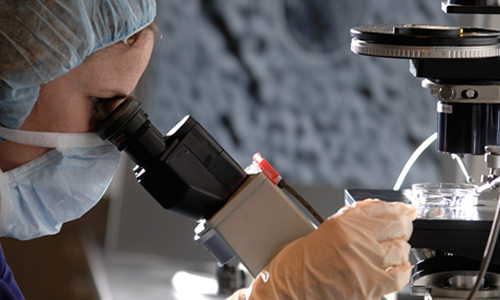Sometimes a full-on assault isn’t the best approach when dealing with a powerful enemy. A more effective approach, in the long run, may be to target the support system replenishing the supplies that keep your foe strong and ready for battle. A group of researchers from the Abramson Cancer Center and the Perelman School of Medicine at the University of Pennsylvania is pursuing this strategy by employing a novel DNA vaccine to kill cancer, not by attacking tumor cells, but targeting the blood vessels that keep them alive. The vaccine also indirectly creates an immune response to the tumor itself, amplifying the attack by a phenomenon called epitope spreading. The results of the study were published this month in the Journal of Clinical Investigation.
Photo Credit: University of Pennsylvania School of Medicine
Previous studies have targeted tumor angiogenesis (the formation of new blood vessels that feed the tumor cells). However, this approach can also interfere with normal processes involved in wound healing and development. Penn researchers avoided this pitfall by designing a DNA vaccine that specifically targets TEM1 (tumor endothelial marker 1), a protein that is overexpressed in tumors and poorly expressed in normal tissues.
“We demonstrated that by targeting TEM1, our vaccine can decrease tumor vascularization, increase hypoxia of the tumor and reduce tumor growth,” says Andrea Facciabene, PhD, research assistant professor of Obstetrics and Gynecology and a faculty member in the Ovarian Cancer Research Center at Penn Medicine. “Our results confirm that we were directly targeting the tumor vasculature and also indirectly killing tumor cells through epitope spreading.”
The Penn team injected mice with a DNA fusion vaccine called TEM1-TT, created by fusing TEM1 complementary DNA with a fragment of the tetanus toxoid (TT). In mouse models of three cancer types (breast, colon, and cervical), tumor formation was delayed or prevented in mice vaccinated with the TEM1-TT DNA vaccine. Specifically, they found that the mouse tumors had suppressed growth, decreased tumor vessel formation, and increased infiltration of immune cells into tumors.
The researchers found that the DNA vaccine, after killing the endothelial cells that make up the tumor vessels (vasculature), also resulted in epitope spreading, meaning that the immune cells of the mice gathered pieces of dead tumor cells (due to hypoxia) to create a secondary immune response against the tumor itself. The vaccine induced specific T cells to fight other tumor cells expression other proteins, in addition to TEM1, thus increasing its therapeutic efficacy.
The new DNA vaccine approach to fight cancer is showing great potential compared to previous studies that focused on tumor cells rather than the blood vessels that allow tumor cells to thrive.
“Until now there have been a lot of clinical trials using DNA vaccines to target tumors themselves, but unfortunately the results have been disappointing,” Facciabene notes. “This is a different approach which should heighten optimism for cancer vaccines in general. Moreover, based on what we’ve seen in our mouse studies, this vaccine doesn’t seem to show any significant side effects.”
The prevalence of TEM1 in a wide range of tumor types coupled with its scarcity in normal vessels makes it a suitable target both for a prophylactic defense against cancer and a complement to other therapies such as radiotherapy and chemotherapy. “Using this vaccine simultaneously with radiation may eventually have a double synergy,” Facciabene says. “Both treatments affect the tumor endothelium, radiotherapy could help the phenomenon of epitope spreading induced by the TEM1-TT vaccine.” In addition to ongoing pre-clinical work with human TEM1, Facciabene and colleagues are planning to move on to Phase I human clinical trials.
The authors suggest that TEM1 may also be an excellent target as a prophylactic cancer vaccine for individuals that have a high risk of developing ovarian cancer, such as carriers of the BRCA1/2 mutations, predominant in breast and ovarian cancer. Research to develop those types of strategies is a key goal of Penn’s Basser Research Center for BRCA. As a bonafide vaccine, TEM-TT DNA vaccine generates a memory immune response, which Facciabene says is an ideal attribute for high risk populations.
Story Source:
The above story is based on materials provided by University of Pennsylvania School of Medicine.





